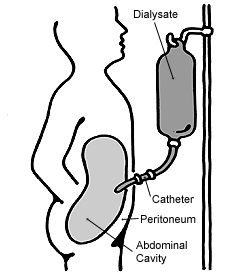Continuous ambulatory peritoneal dialysis
| Peritoneal dialysis | |
|---|---|

Diagram of peritoneal dialysis
|
|
| Specialty | nephrology |
| ICD-9-CM | 54.98 |
| MeSH | D010530 |
Peritoneal dialysis (PD) is a type of dialysis that uses the peritoneum in a person's abdomen as the membrane through which fluid and dissolved substances are exchanged with the blood. It is used to remove excess fluid, correct electrolyte problems, and remove toxins in those with kidney failure. Peritoneal dialysis has better outcomes than hemodialysis during the first couple of years. Other benefits include greater flexibility and better tolerability in those with significant heart disease.
Complications may include infections within the abdomen, hernias, high blood sugar, bleeding in the abdomen, and blockage of the catheter. Use is not possible in those with significant prior abdominal surgery or inflammatory bowel disease. It requires some degree of technical skill to be done properly.
In peritoneal dialysis, a specific solution is introduced through a permanent tube in the lower abdomen and then removed. This may either occur at regular intervals throughout the day, known as continuous ambulatory dialysis, or at night with the assistance of a machine, known as automated peritoneal dialysis. The solution is typically made of sodium chloride, hydrogen carbonate, and an osmotic agent such as glucose.
Peritoneal dialysis was first carried out in the 1920s; however, long term use did not come into medical practice until the 1960s. The solution used for peritoneal dialysis is on the World Health Organization's List of Essential Medicines, the most effective and safe medicines needed in a health system. The cost of dialysis solution in the developing world is about 6.77 to 7.30 USD per two liter bag or about 12,000 USD per year. In the United States peritoneal dialysis costs the government about 53,400 USD per person per year. As of 2009 peritoneal dialysis was available in 12 out of 53 African countries.
...
Wikipedia
